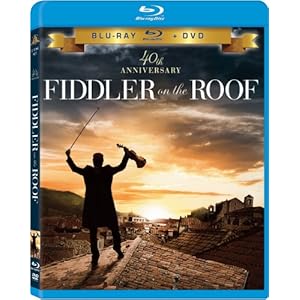

 Like so many of the most popular musicals, Fiddler on the Roof is both corny and indelible, over time becoming something of a victim of its success through constant repetition (how can we miss it when it never goes away?). Norman Jewison's 1971 film adaptation of the 1964 Broadway musical is, of course, a part of that—must I say it?—tradition of the play's cultural tenacity.
Like so many of the most popular musicals, Fiddler on the Roof is both corny and indelible, over time becoming something of a victim of its success through constant repetition (how can we miss it when it never goes away?). Norman Jewison's 1971 film adaptation of the 1964 Broadway musical is, of course, a part of that—must I say it?—tradition of the play's cultural tenacity.
Jewison ably blows up the play into something highly cinematic through the use of thoughtful camera blocking, location photography and editing. By making a 70mm epic of the play by Joseph Stein (book), Jerry Bock (music) and Sheldon Harnick (lyrics), Jewison weds stage shtick to Dr. Zhivago. It's a gamble that doesn't entirely pay off—melancholy weighs down the three-hour picture in a way that a live performance could escape—which explains why the 1979 re-release trimmed thirty-two minutes. Still, Jewison's film is an unusually faithful film adaptation of a hugely successful musical, a victory in itself, and having John Williams as the musical adapter, Isaac Stern as the fiddle soloist, and Jerome Robbins as the choreographer doesn't hurt.
Recreating his West End role, Topol plays Tevye, the avuncular, put-upon patriarch of an Orthodox Jewish family in 1905 Russia. Like his rural village of Anatevka, Tevye contentedly endures, with high hopes for his family despite tough times. Tevye's main concern of late is troubleshooting the men who want to marry his daughters (mostly by circumventing the established tradition of working through a matchmaker), but the Jews of Anatevka live under the spectre of a much-greater threat: pogroms carried out, by somewhat reluctant neighboring Christians, under the orders of the czarist government. Both concerns give the tale(based on the stories of Sholom Aleichem) the tenor of a Biblical test of faith. Like Job, Tevye often looks skyward and asks God, "Why me?" as he puzzles out the right thing to do.
Tevye's daughter Tzeitel (Rosalind Harris) and poor tailor Motel (Leonard Frey) love each other, and she becomes determined to turn the tide of matchmaking tradition before she's forced to marry the much-older (but rich) butcher Lazar Wolf (a terrific Paul Mann). Unfortunately for Tevye, his other two daughters Hodel (Michèle Marsh) and Chava (Neva Small) take their cues from their older sister and a couple of bold, tradition-bucking suitors: political-minded student Perchik (Paul Michael Glaser) and Orthodox Christian (gasp!) Fyedka (Raymond Lovelock).
Zero Mostel was a prize ham as Tevye on Broadway, but Topol's career-defining performance impresses in its own way. Though undeniably "big," Topol's work here is also grounded enough to qualify it as well-calibrated to film. His rumbling vocals and arm-wagging strut help him to make a meal of "If I Were a Rich Man," one of the plays many well-known songs (others include "Tradition," "Matchmaker," family reflections "Sunrise, Sunset" and "Do You Love Me?" and "Miracle of Miracles," Motel's joyous exclamation of love). As a musical look at family, generational and cultural conflict, and faith, Fiddler on the Roof makes a virtue of its quaintness.

|
|
 |
MGM delivers, via Fox, a 2-Disc Blu-ray + DVD combo pack for the hi-def debut of Fiddler on the Roof. The double-format set is a bargain and a half, with excellent A/V credentials and a full battery of bonus features. The film has never looked so good as it does on Blu-ray: the film-like image perfectly captures the hazy look that won the picture the Best Cinematography Oscar, and the color is just right. There's a brief bout of flicker and mild but fairly insistent telecine wobble, as well as occasionally evident edge enhancement, but these are quibbles with a generally impressive picture upgrade. The DTS-HD Master Audio 7.1 mix is fairly glorious in delivering the film's robust score, though on rare occasions the high fidelity reveals limitations in the source material.
First up among the extras is an audio commentary by Jewison and Topol. Recorded separately, the pair share their recollections about the play's journey from stage to screen, their choices of interpretation, and the challenges of production.
The vintage featurette "Norman Jewison, Filmmaker" (49:33, SD) gives a behind-the-scenes look at the filming.
Norman Jewison Looks Back comprises the misnamed "On Directing" (3:28, SD), with the story of how Jewison got the job, despite not being Jewish; "Strongest Memory" (:57, SD); "Biggest Challenge" (1:11, SD); "On Casting" (1:20, SD) adressing the Zero Mostel issue; and "A Classic?" (2:34, SD).
The curiosity "Tevye's Dream in Color" (5:56, SD) presents the scene in its original form, with an introduction by Jewison. "Side By Side Comparison" (1:39, SD) simultaneously presents both versions.
"John Williams: Creating a Musical Tradition" (11:32, SD) is a nice featurette mostly focusing on Williams work as the film's musical adapter, conductor and co-orchestrator.
"Songs of Fiddler on the Roof" (14:43, SD) gathers interview clips of the guys responsible for the play's book, music and lyrics: Joseph Stein, Jerry Bock and Sheldon Harnick.
Also of strong historical interest is the "Deleted Song: Any Day Now" (3:07, SD), presented in an orchestrated demo.
"Tevye's Daughters (16:28, SD) features the recollections of Rosalind Harris, Michele Marsh and Neva Small.
"Set in Reality: Production Design" (9:50, SD) looks at the incredible production design of Robert Boyle.
"Storyboard to Film Comparison" (21:04, SD) does the honors for several musical sequences.
Last up are Trailers, Teasers and TV Spots.
 |